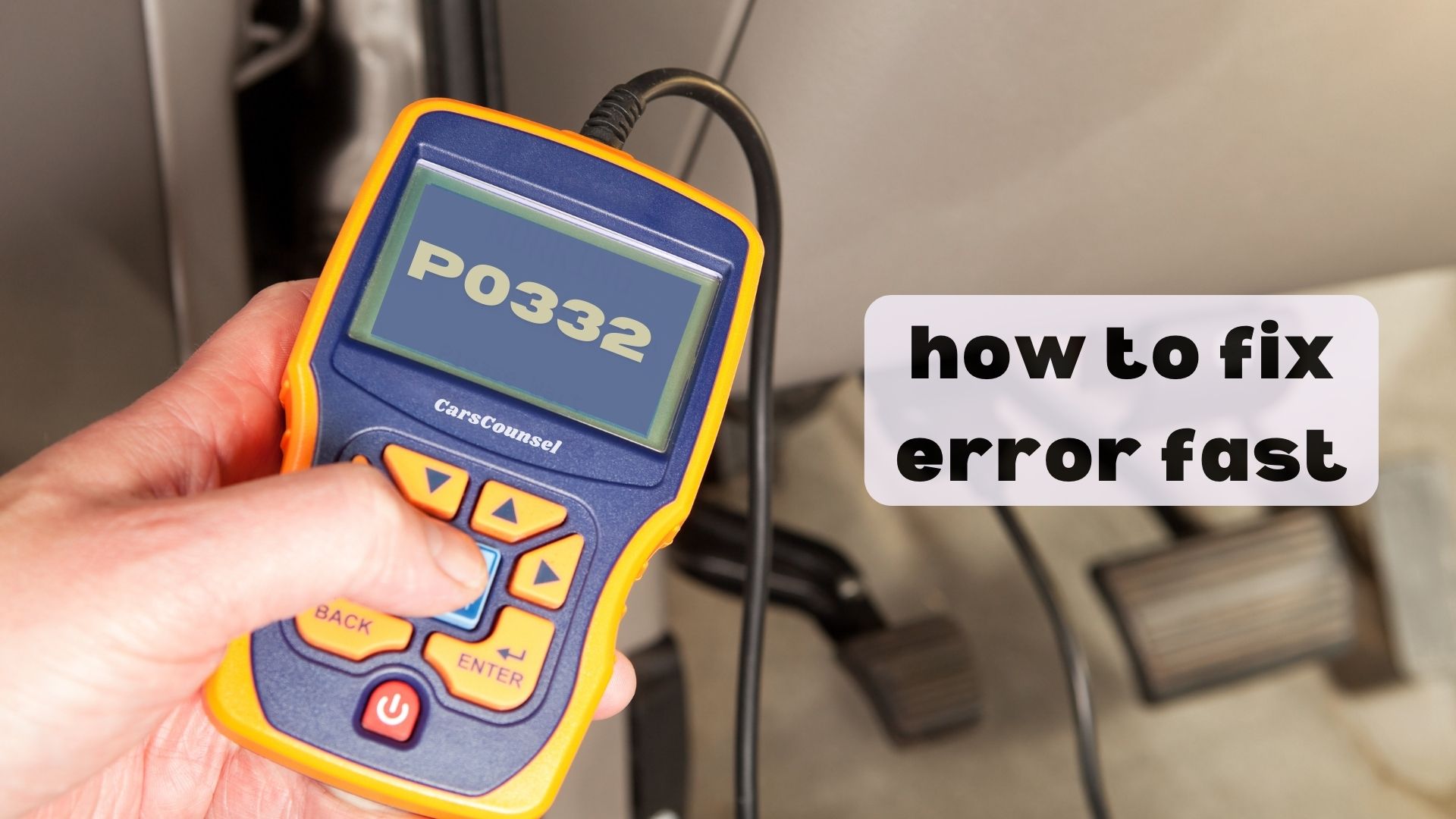When your car’s Engine Light comes on, it’s often a mystery what’s causing the issue. But if you’ve got a P0332 code, you’re in luck – it’s a relatively specific problem. This code indicates a faulty Knock Sensor Bank 2, which affects the Engine Control Module‘s ability to control ignition timing. You’re probably wondering what that means for your engine’s performance and what might be causing it. Let’s break it down and examine the possible causes, symptoms, and tech notes to get your engine running smoothly again.

Quick Navigation
Key Takeaways
- The P0332 code indicates a faulty Knock Sensor Bank 2, affecting the Engine Control Module’s ability to control ignition timing.
- Faulty Knock Sensor Bank 2, poor electrical connections, short or open circuits, and faulty ECM are possible causes of the P0332 code.
- Symptoms include the Engine Light ON, engine lack/power loss, and unusual engine knocking or pinging noises.
- Inspecting the knock sensor and its wiring, checking for engine detonation, and using a scan tool can help diagnose the issue.
- Ignoring the P0332 code can lead to severe engine problems, while prompt repair can prevent potential long-term engine damage.
Code Meaning
When your car’s onboard computer triggers the P0332 code, it indicates that the Knock Sensor Bank 2 isn’t functioning properly.
This sensor failure affects the Engine Control Module‘s (ECM) ability to control ignition timing, which can lead to engine damage if not addressed.
The Knock Sensor system protects the engine from damaging levels of detonation, also known as spark knock, by detecting abnormal engine vibrations.
With a faulty sensor, the ECM can’t adjust ignition timing accurately, potentially causing decreased engine performance and fuel efficiency.
Possible Causes
The faulty Knock Sensor Bank 2 is often the primary culprit behind the P0332 code, but it’s not the only possible cause.
You may also encounter Sensor Failure due to a poor electrical connection in the Knock Sensor Bank 2 circuit or a short or open circuit in the harness.
Additionally, a Faulty Engine Control Module (ECM) could be the root of the problem.
Wiring Issues, such as damaged or corroded wiring, can also trigger the P0332 code.
It’s essential to inspect the entire knock sensor system to identify the underlying cause of the issue.
Tech Notes
You’ll typically find that the P0332 code doesn’t cause engine performance problems, as the knock sensor system is primarily designed to protect the engine from damaging levels of detonation, also known as spark knock.
The knock sensor system uses piezo-electric crystal technology to detect abnormal engine vibrations. Replacing the knock sensor usually resolves the issue.
The knock sensor system detects abnormal engine vibrations via piezo-electric crystal technology, and replacement often resolves the issue.
The control module learns a minimum noise level, or background noise, at idle from the knock sensor. In engine tuning, this technology helps optimize ignition timing.
With proper sensor technology, you can guarantee efficient engine performance and prevent potential damage.
Description and Symptoms
Your vehicle’s Knock Sensor system plays a crucial role in enabling the Engine Control Module (ECM) to control ignition timing, effectively protecting the engine from potentially damaging levels of detonation, also known as spark knock.
This system guarantees peak Engine Performance by monitoring and adjusting ignition timing to prevent engine damage.
When the Knock Sensor system malfunctions, you may notice symptoms like the Engine Light ON, Engine Lack/Loss of Power, or unusual engine knocking or pinging noises.
These symptoms indicate a problem with the Sensor Functionality, which can negatively impact your vehicle’s overall performance.
Need More Information?
Faulty knock sensor systems can lead to decreased engine performance, poor fuel efficiency, and potential long-term engine damage if left unaddressed.
If you’re experiencing issues with your car, it’s essential to address sensor failure promptly. For effective car maintenance, consider the following:
- Inspect the knock sensor and its wiring for damage or corrosion.
- Check for engine detonation, which can cause sensor failure.
- Use a scan tool to monitor sensor readings and engine performance.
- Consult a professional mechanic if you’re unsure about diagnosing or repairing the issue.
Common Symptoms
The P0332 code is typically accompanied by a set of distinct symptoms that can help you identify the issue.
You may notice engine knocking or pinging noises, which can be a sign of sensor failure. Additionally, you might experience decreased engine performance, such as a lack or loss of power.
The check engine light will likely illuminate, indicating a problem with your vehicle’s engine. These symptoms can be caused by a faulty knock sensor, which can lead to reduced engine performance and decreased fuel efficiency if not addressed promptly.
Diagnosing the Issue
Diagnosing the P0332 code issue involves a thorough inspection of the knock sensor and its circuitry.
Thorough inspection of the knock sensor and its circuitry is essential for diagnosing the P0332 code issue.
You’ll need to check for signs of physical damage, corrosion, or wear on the sensor and its connectors. Next, perform wiring checks to verify there are no shorts, opens, or corrosion in the circuit.
- Sensor Inspection: Visually inspect the knock sensor for signs of damage or corrosion.
- Wiring Checks: Check the wiring and connectors for shorts, opens, or corrosion.
- Circuit Voltage Test: Use a multimeter to test the circuit voltage and confirm it’s within the recommended specifications.
- Scan Tool Data: Use a scan tool to monitor sensor readings and engine performance to help identify the root cause of the issue.
Importance of Prompt Repair
Failing to address the P0332 code issue promptly can lead to more severe engine problems down the road.
You risk compromising your car’s safety and engine performance if you ignore this warning sign. A faulty knock sensor can cause engine detonation, which can lead to costly repairs or even engine failure.
More OBD-II Codes
| P1382 | P1456 | C1204 | C1203 |
| P1457 | P1491 | P1773 | P1783 |
| P1788 | P1002 | P1003 | P1013 |
| P1014 | P1015 | P1016 | P1018 |
| P1498 | P1656 | P1658 | P1666 |
| P1768 | P1668 | P1738 | P1739 |
Frequently Asked Questions
Can I Drive Safely With a P0332 Code?
You can drive safely with a P0332 code, but be cautious with your driving habits as the issue may affect engine performance, leading to decreased power and potential long-term damage if left unaddressed.
Will a P0332 Code Trigger a Failed Emissions Test?
You’re wondering if a P0332 code will trigger a failed emissions test. In most cases, no, it won’t, as the knock sensor issue doesn’t directly affect emissions standards or inspection requirements, but it’s still essential to address the problem to avoid potential long-term engine damage.
How Much Does It Cost to Replace a Knock Sensor?
You’ll likely pay between $100 to $300 for the knock sensor replacement, depending on your vehicle’s make and model. Labor costs will add $100 to $200, so expect a total cost of $200 to $500 for the repair.
Can a P0332 Code Cause Engine Failure if Ignored?
You think ignoring a P0332 code won’t harm your engine? Think again! If left unchecked, sensor damage can lead to engine seizure, causing catastrophic damage. Don’t risk it; address the issue promptly to avoid costly repairs and potential engine failure.
Will a Tune-Up Fix a P0332 Code?
You’re wondering if a tune-up will fix a P0332 code. Unfortunately, it won’t, as a tune-up typically addresses spark plug wear and fuel injector cleaning, which aren’t related to the knock sensor issue causing the code.
Conclusion
You’ve got a ticking time bomb on your hands if you don’t address the P0332 code pronto. The faulty Knock Sensor Bank 2 is like a loose thread that can unravel your engine’s performance, causing decreased power and fuel efficiency. Don’t let it snowball into a major issue – get to the root of the problem and fix it before it’s too late. Every minute counts, so don’t drag your feet – prompt repair is key to preventing engine damage and keeping your vehicle running smoothly.

